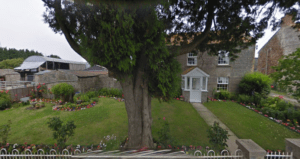It was a delight to have drawing paper. Sometimes Dad would bring home from work sheets that had been printed on one side, presumably packing notes for equipment received. The paper was cream, cartridge quality, very different from the flimsy 80 gsm paper now found in packages. Sometimes, drawing books would come as gifts at Christmas, they would have been particularly cherished.
More often Christmas gifts would be the sort of book that contained printed line drawings where all that was required was a paintbrush and water to reveal the colours with which the pages had been impregnated. Too much water applied at one time to a page would simply have resulted in the colours all running into each other. In memory the drawings whose colours would be revealed by the application of water were of jungle animals, or the sort of creatures we imagined inhabited jungles. One Christmas, there came a “jungle” scene printed on heavy card and felt tipped pens with which to colour the animal outlines. The colouring set came with a printed master drawing showing how the animals should appear. No-one seemed to have thought it misleading to show lions, elephants and giraffes in a jungle, or that a tiger would have been unlikely companion for the plains dwellers.
Street was the nearest town, but Saturday shopping trips were usually to Taunton, Yeovil or Bridgwater. Visits to Street offered the opportunity to go to the toy shop that was there. One Saturday, pocket money was spent on two small notepads. All that would be required would be a black pen and excellent sketches would follow.
Standing at the landing window at the back of our house, a memory remains clear. There were sheep in the field across the lane from the house and a picture of sheep in a field seemed a perfect opportunity to practice artistic skills. The figures that appeared on the page bore no resemblance to the Southdown ewes that grazed peacefully on the spring grass. The drawings looked like the efforts of a pupil just starting at primary school.
Tearing the page of the very badly drawn sheep from the book, I decided that my talents perhaps lay in drawing something else. Living deep within a rural community, there was an abundance of bird life in the garden. Unfortunately, the birds that appeared in the notebook looked nothing like those enjoying the spring day outside.
It was an instructive afternoon, teaching me that my best contribution to art would always to be to leave things undrawn.

 My aunt has been “shielded.” Being a sprightly eighty year old is not a sufficient weight to counter the fact that she suffered cancer last year and is now deemed to be vulnerable.
My aunt has been “shielded.” Being a sprightly eighty year old is not a sufficient weight to counter the fact that she suffered cancer last year and is now deemed to be vulnerable.